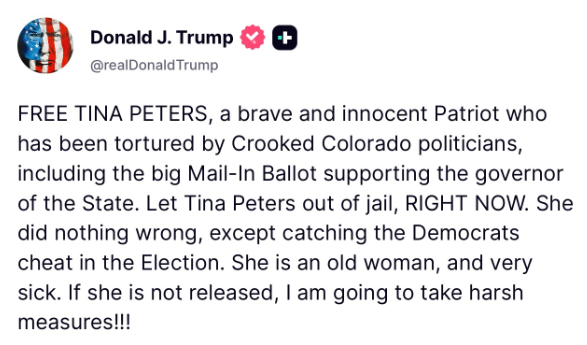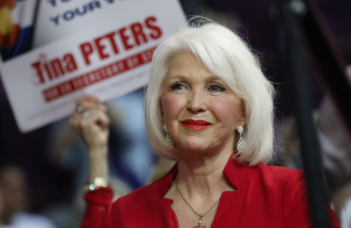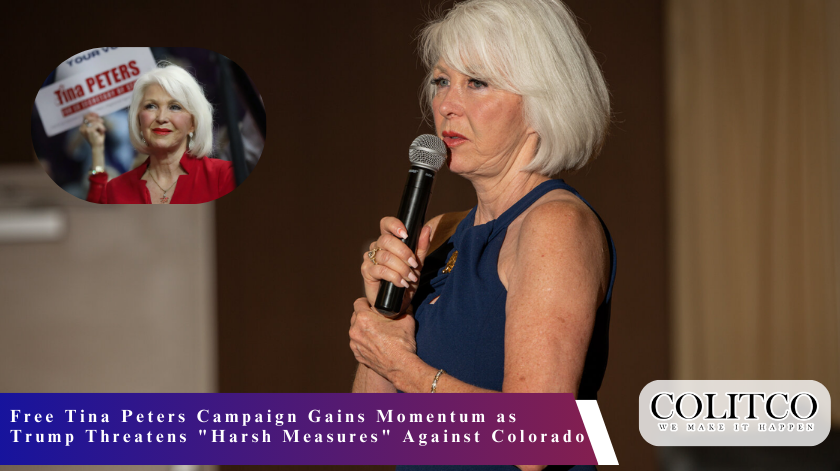The political battle over former Mesa County Clerk Tina Peters reached a new crescendo this week as President Donald Trump escalated his demands for her release from prison. Trump posted on Truth Social threatening “harsh measures” if Colorado doesn’t free the 69-year-old election official, who is serving nine years for breaching voting system security.
“FREE TINA PETERS, a brave and innocent Patriot who has been tortured by Crooked Colorado politicians,” Trump wrote Thursday morning. “She is an old woman, and very sick. If she is not released, I am going to take harsh measures!”
Peters has become the focal point of a grassroots “Free Tina” movement that has flooded Colorado Governor Jared Polis’s office with over 800 messages demanding her pardon. The campaign reflects broader tensions between federal and state authority, with Trump’s Justice Department now reviewing her conviction.

Trump escalates demands to release Colorado election clerk Tina Peters from prison
The Case That Started It All
Peters was convicted in August 2024 on seven of ten charges related to a 2021 security breach at Mesa County’s election office. Prosecutors proved she allowed an unauthorised person to use someone else’s identity to access voting equipment during a software update, then leaked sensitive data online.
The breach occurred when Peters facilitated access to Mesa County’s Dominion voting machines for an individual connected to MyPillow CEO Mike Lindell. The leaked data was later displayed at Lindell’s “cyber symposium” as part of efforts to prove baseless claims about the 2020 election.
Judge Matthew Barrett sentenced Peters to nine years in prison in October 2024, calling her actions an “immeasurable damage” to electoral trust. Barrett twice during the hearing called Peters a “charlatan” who peddled snake oil that has been disproven again and again.
Peters made history as the first election official in the United States convicted of criminal charges related to efforts to overturn the 2020 presidential election results.
Trump’s Federal Intervention Campaign
Since returning to office, Trump has made Peters’s release a priority. In May 2025, he directed the Department of Justice to “take all necessary action to help secure the release” of Peters, whom he described as a “hostage” held by Democrats.
The DOJ filed a statement saying it would review Peters’s prosecution, including “whether the case was ‘oriented more toward inflicting political pain than toward pursuing actual justice or legitimate governmental objectives.'”
This federal intervention faces significant legal hurdles. Peters was convicted under Colorado state law, limiting federal authority to intervene. Constitutional law experts note that presidential pardons only apply to federal crimes, not state convictions.
Republican Congresswoman Lauren Boebert has supported the effort, saying she sent a formal FBI request to investigate Peters’s “sentencing and treatment.” However, legal scholars question what leverage federal authorities possess over state court decisions.
Grassroots Movement Floods Officials
The “Free Tina Peters” campaign has mobilised supporters nationwide to pressure Colorado officials. Governor Polis’s office has received over 800 messages since January, including 648 exclamation points, from Peters supporters demanding a pardon.
Many messages come from outside Colorado, with form letters generated through online political tools. “Governor, as a gay Jewish man, you understand persecution, and you know it when you see it,” wrote one supporter from outside Colorado who takes summer trips to the state.

Former Mesa County Clerk Tina Peters
However, not all correspondence supports Peters. Over 140 letter writers have urged Polis to resist federal pressure, with one writing: “(Peters) broke the law in Colorado, and she needs to complete her entire sentence.”
The governor’s office has maintained that Peters has not formally applied for clemency and that any decision would be made “regardless of bullying and threats.”
State Officials Push Back
Colorado Attorney General Phil Weiser has condemned federal involvement as a “grotesque attempt to weaponize the rule of law.” His office stated: “Tina Peters is in prison because of her own actions. A grand jury indicted her and a trial jury found her guilty of breaking Colorado’s criminal laws. No one is above the law.”
State officials emphasise that Colorado’s election systems underwent multiple audits confirming their accuracy. State audits have found no evidence of election fraud in Colorado in the 2020 election and confirmed that the machine vote tally matched the markings on the paper ballots.
Colorado Secretary of State Jena Griswold has been particularly vocal, stating: “Tina Peters is a criminal who compromised her own voting equipment to try to prove Trump’s Big Lie. Trump is weaponizing the Department of Justice.”
Legal Challenges and Federal Jurisdiction
Peters’s legal team has filed a federal habeas corpus petition arguing that her detention violates First Amendment rights by silencing her voice on election security issues. During a July 2025 hearing, federal magistrate appeared sceptical about whether federal courts could order her release from state custody.
The case highlights fundamental questions about federal-state jurisdiction. Republican state Representative Matt Soper, who holds a law degree, called it “a very classic constitutional analysis of stay in your lane” regarding DOJ involvement.
Some Republican officials worry about precedent. Soper noted concern if “leverage at the end of the day is going to be threatening to pull back federal funds or threatening to remove federal jobs from Colorado or threatening economic sanctions.”
Also Read: Trump-Zelenskiy White House meeting signals new thaw
Political Implications and Future Outlook
The Peters case reflects broader tensions in American politics between federal power and state sovereignty. Legal experts note that Trump has shown a pattern of “overruling due process” through pardons and political interventions.
Trump’s aggressive stance on Peters aligns with his broader political strategy of challenging state-level prosecutions of his allies. The case parallels his pardons of January 6th defendants and other supporters facing legal consequences.
Peters remains at La Vista Correctional Facility in Pueblo, Colorado, while her state appeal proceeds. Her legal team continues pursuing federal intervention, though constitutional barriers remain significant.
The outcome may set important precedents for federal-state relations and the limits of presidential power over state criminal justice systems. As the legal battles continue, the “Free Tina Peters” movement shows no signs of diminishing, ensuring this case will remain a flashpoint in American politics.












